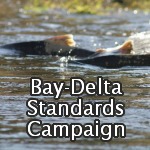Article from Maven's Notebook.
Post excerpt from https://mavensnotebook.com/2017/07/12/california-water-alliance-nrdc-and-others-weigh-in-on-hr-23-the-the-gaining-responsibility-on-water-grow-act-of-2017/
July 12, 2017
Maven
More more organizations issuing statements HR 23, the Gaining Responsibility on Water (GROW) Act of 2017 which the House is expected to take up sometime this week.
For all posts regarding H.R. 23 posted on Maven’s Notebook, click here.
…
From the American Sportfishing Association, Golden Gate Salmon Association, Pacific Coast Federation of Fishermen’s Assocations, and Cal Trout:
On behalf of the undersigned organizations, we are writing to urge you to oppose H.R. 23, The Gaining Responsibility on Water Act of 2017 (Valadao), a bill to preempt State law and weaken or eliminate protections for California’s rivers, salmon fishery, and Bay-Delta estuary.
This legislation, which is similar to H.R. 1837 of 2012 and more recently H.R. 3946, would dramatically weaken or eliminate federal laws protecting salmon and other native fish in California, which provide for thousands of fishing related jobs in California and Oregon and protect water quality for Delta farmers. It would explicitly preempt state water law and water rights, overturning more than a century of precedent under the 1902 Reclamation Act. As such, H.R. 23 establishes a dangerous precedent of federal usurpation of state rights. It also directs the United States to breach its obligations under a court-approved settlement to restore the San Joaquin River.
H.R. 23 would have devastating effects on salmon fishermen and thousands of small businesses that rely on salmon. California’s Bay-Delta estuary is a key waterway traversed by salmon. This bill would have significant negative impacts on the system and harm commercial and recreational fishermen and communities that depend on salmon. The closure of the salmon fishery in 2008 and 2009 resulted in thousands of lost jobs in California and Oregon. On top of that the last several fishing seasons have been very poor due to the drought and water management decisions that deprioritized salmon and salmon fishermen. Now, with H.R. 23, the livelihoods of commercial and recreational salmon fishermen, Delta farmers, fishing guides, tackle shops, and communities across California and along the West Coast all hang in the balance. The bill would greatly increase the risk that winter-run Chinook salmon and other native fish species are driven extinct and would greatly harm the commercially valuable fall run salmon.
California Governor Brown and Senators Feinstein and Harris have recently expressed pointed opposition to H.R. 23. Many California politicians have opposed similar legislation in recent years, including opposition to H.R. 3964 (Valadao, R-CA) and H.R. 5781 (Valadao, R-CA) in 2014, and H.R. 2898 (Valadao, R-CA) in 2015.
We oppose this legislation because it:
- Eliminates Protections for Salmon and other Native Fisheries: Section 108 would eliminate scientifically based protections for salmon and other native species under the Endangered Species Act. Since 2009, under both Republican and Democratic governors, the State of California has been on record opposing riders and legislation to weaken, suspend or overturn the Endangered Species Act in the Bay-Delta. These protections are the bare minimum needed to keep listed species on life support.
- Preempts State Law: Several provisions would preempt State water law, overturning more than a century of federal precedent since the 1902 Reclamation Act was enacted. Section 108 would prevent the State of California from imposing conditions on state water rights to protect salmon under State law, as well as preventing the State from managing the State Water Project in compliance with state law. This section would also undermine a bipartisan package of water policy reform legislation adopted by the State of California in 2009, and preempt state laws protecting salmon and other native species. Section 113 would preempt state laws requiring restoration of the San Joaquin River and its native salmon runs. These provisions set a dangerous precedent across the United States and are a primary reason why numerous states and state attorney generals opposed H.R.23’s predecessor, H.R. 1837, in 2012.
- Overturns Settlement to Restore the San Joaquin River: H.R. 23 would overturn the court and Congressionally-approved 2009 San Joaquin River Restoration Settlement Act which ended twenty years of litigation on the San Joaquin River. As a consequence, 60 miles of California’s second longest river would likely dry up.
- Significantly Weakens the 1992 Central Valley Project Improvement Act: H.R. 23 would undermine the 1992 Central Valley Project Improvement Act, signed into law by President Bush, to encourage water conservation, protect salmon, and reduce taxpayer subsidies, and establish water supply and environmental protection as co-equal goals of the Central Valley Project. Undercutting these most basic water management laws would bring tremendous legal and institutional uncertainty into state and federal water conveyance systems of the State of California, setting back efforts to settle these incredibly contentious water issues by at least 50 years.
H.R. 23 has never been subject to a single committee hearing to receive public input from the State of California, hunting organizations, sport and commercial fishermen, tribes, or environmental groups, even though the bill could weaken the ability of state and federal agencies to manage limited water resources for all beneficial uses. Last year Congress passed legislation addressing California’s water operations in the Water Infrastructure Improvements for the Nation Act of 2016 (P. L. 114-322). H.R. 23 would undermine that legislation, which supporters claim requires that operations of the state and federal water projects comply with state law and the Endangered Species Act. We opposed the legislative rider at the end of 2016, but HR 23 would eliminate any environmental safeguards that our communities and jobs depend on.
Our organizations are committed to addressing natural resources challenges in California through long-term solutions that restore and maintain the health of the environment on which the state’s economy and the quality of lives depend. This bill would do the opposite. Investments in water recycling, stormwater capture, water use efficiency, groundwater cleanup and other regional water supplies will provide communities with drought-resistant water supplies, create local jobs, and sustain our economy and environment. These are true solutions to California’s drought, not H.R. 23.
For all of these reasons, we strongly urge you to oppose H.R. 23.
See signed copy of letter here: 2017.7.11.PCFFA GGSA ASA CalTrout.Oppose HR 23









